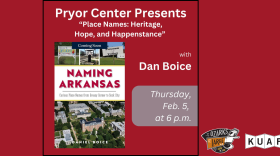NPR's Mary Louise Kelly is expanding her hosting duties. She's staying at All Things Considered, but now also hosting NPR's new national security podcast, Sources & Methods. New episodes are available each Thursday. She says the podcast title is inspired by two chief terms in the national security realm.
Mary Louise Kelly: So sources and methods. This is an espionage term widely used in intelligence circles, national security stories. It refers to how information is collected, where it is collected, like how do we know what we know? Who told us? So sources—that may be a fellow human, somebody well placed in the Kremlin, for example. It may be images coming in from a satellite.
Methods refers to the techniques, the tradecraft that are helping someone gather and analyze that information. You guard these with your life because you want to protect your sources and methods. You don't want the person you are trying to collect information about to know how you know what you have learned because that might allow them to shut down that channel. So you sometimes hear them referred to as the crown jewels of the intelligence community. You will hear American presidents over the years talk about protecting sources and methods, how important that is.
As we were thinking about what to name the podcast, I thought, well, journalists kind of do that too. For the record, we are not spies. We are journalists. We are reporters. But we also work stories to try to advance our understanding of what is happening in our communities and the world. The key difference being we share everything we've learned with our audience. But we do protect people who may be putting themselves at some risk by sharing information that they're not authorized to disclose. So we both are practicing these things, and it felt like that's a nice way of tying together national security reporting.
Kyle Kellams: What can laypeople—what can we learn about our lives by listening to these stories?
Mary Louise Kelly: Yeah, it's such a good question because so much of national security, foreign policy reporting can feel abstract. They're about wars and places that maybe are far away, halfway around the world, and involving big abstract sounding things like peace treaties or NATO or collective defense.
What we try to do, what I'm trying to do on the podcast, is step a little bit away from analysis, because there are plenty of podcasts out there if you want analysis and editorializing about things, and just return the focus to the reporting. Let you hear in real time our reporters talking about the stories they are working, what questions they're asking, who they're putting those questions to, how they're getting.
We had, on one of our first episodes, our correspondent in Kyiv who had just been to a hospital near the front lines near Dnipro in Ukraine, and was talking about what it takes to get the team to that place to start to do the reporting. What kind of questions you're asking, what some of the obstacles are, what questions he still has that he wasn't able to answer. And so that will inform the next story.
I think I have learned over the years when I'm reporting on a war or a summit or something big and far away sounding, if I can make it human and find the little detail that will resonate to another human being, that goes a long way. You're going to hear that every week on this podcast. Just the little details from the reporters’ notebooks of my colleagues who are out and about in the world and out and about in Washington and working their sources.
Kyle Kellams: It's valuable to have that sort of approach for listeners. Whether you're talking about national security or domestic policy or anything, it's a nice way to reconnect people in this fractured media landscape with what journalism does and can do.
Mary Louise Kelly: And it's a nice way for us. NPR has been committed—we punch above our weight in terms of international news gathering and reporting on the wider world and trying to remind people, particularly now, in a moment where the news cycle is so continuously dominated by events in Washington and by the Trump White House, the rest of the world is ticking on. They've got all kinds of stuff going on. So let's look at that. What is unfolding that you may have lost sight of, and give you just a few windows into: oh, I heard this headline, Tulsi Gabbard just did something, director of national intelligence. Let's understand how that actually—why it matters, what you're actually hearing. And I want you to be able to walk away and think, oh, now I get it. Now that headline makes sense. And now I'm teed up for when I hear the next thing in a way that feels less overwhelming and more like, oh, I get it, I think I understand this. What's next?
Kyle Kellams: And as you mentioned, this is about reporting. This isn't about analysis. I think back to this summer's summit with Presidents Putin and Trump. They came out for this press statement, and instantly there was information going across all sorts of channels, but instantly it wasn't really telling us anything. We couldn't really learn anything in the moment.
Mary Louise Kelly: Yes. I was at that summit in Anchorage, Alaska. And I will tell you that even if you were in the room, there was a little while where we're all thinking, wait, what just happened? Did we just all fly all the way to Alaska? And that was a 20-, 25-minute press conference at which, unless I missed it, there was no major headline here.
But I will tell you, it's always been my belief it is still worth getting on the plane. It is worth going. It is worth being in the room. You notice little details, like who's in the room, who walked in, who was first, who's talking to who, who looks happy, who looks like they just can't believe what just unfolded behind the scenes. You do get little tidbits.
And I love being able to bring that sense of, we're here. We're helping you try to understand this in real time. And we walked—we were broadcasting live from the room where Putin and Trump came out and gave brief statements, took no questions, much to the chagrin of me and every other reporter in that room. Immediately, our White House correspondent, Tamara Keith, who was also there, and I ran back out. And we're updating NPR's live coverage and trying to give you a sense of, okay, here's what we know, here's what we don't, here's where this may go next.
We were able to bring you, I believe it was the next week, reaction and reporting from our correspondents in Moscow and Kyiv. We’re one of the only news organizations, by the way, that has kept bureaus open in Kyiv and Moscow all through the war in Ukraine. And they're hearing really different things, and they're out and about in the streets and telling us, okay, this is what it feels like.
It was fascinating. I'll just share one little piece of that. Greg Myre, our correspondent in Kyiv, is reacting to all of the diplomacy and telling me about his interviews and how he's trying to report this out on the ground in Ukraine. But he said something about Kyiv feels more and more normal each time he goes on a reporting trip there—that you don't really see soldiers in the street that much. And I stopped and paused on that, because it was in a week when the president of the United States had deployed federal troops on the ground here in Washington, D.C. Greg and I kicked that around a little bit and finally said, huh, there are more armed members of the military patrolling the streets of Washington, D.C., right now than there are on the streets of Kyiv, a country that has been at war for three and a half years. Think about that.
Kyle Kellams: All right. Here's an impossibility in the 90 seconds we have left. Is there a learning curve to interviewing and resourcing diplomats and perhaps spies?
Mary Louise Kelly: Oh, sure. I launched the intelligence beat for NPR back in 2004. And I exaggerate not when I tell you I didn't even have the number of the press officer at the CIA, which you can probably understand from that, that I did not have any sources. I had no sources and methods to protect. So you start working it, and one call leads to another. You call back after you get a story out there and say, what did I get right? Who should I be talking to next? What questions would you encourage me to think about? Could you forward this email asking this person to take my call? And you start building a network, and it pays dividends. And 20 years later, I'm still working it.
Kyle Kellams: All right. New episodes Thursday. Mary Louise, thank you for your work. Thank you for your time.
Mary Louise Kelly: Kyle, it was a pleasure to speak with you. Thank you.
Kyle Kellams: Mary Louise Kelly is the host of the new podcast Sources & Methods about national security. New episodes are released each Thursday. You can also hear her weekdays as a host of All Things Considered. We spoke via Zoom earlier this month.
Ozarks at Large transcripts are created on a rush deadline. Copy editors utilize AI tools to review work. KUAF does not publish content created by AI. Please reach out to kuafinfo@uark.edu to report an issue. The audio version is the authoritative record of KUAF programming.








